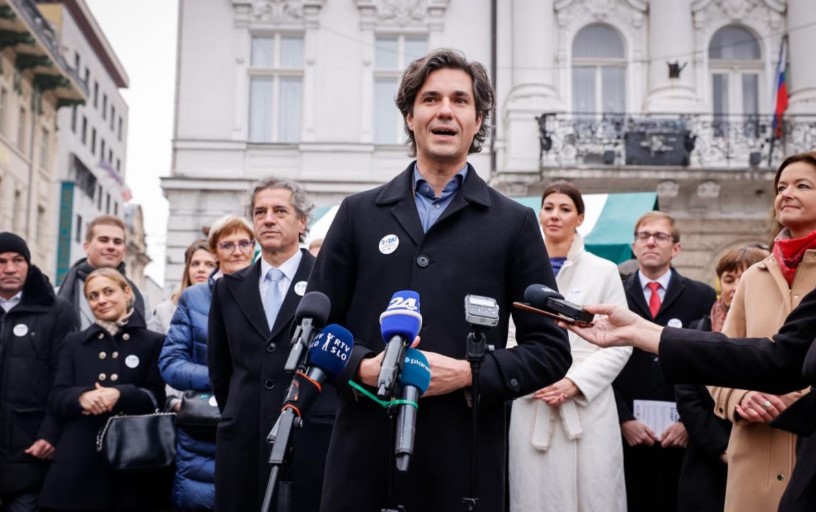The government has repeatedly claimed that increasing the number of ministries will not cost the taxpayers anything. This was at the core of all arguments of the government politicians in the pre-referendum debates focused on the Government Act. The media took them at their word and wrote articles exclusively with their political promises in mind. The electorate also believed them and allowed the Golob government to further expand the already bloated and wildly inefficient apparatus of executive power. The media claimed that this would cost the taxpayers nothing. More ministers and secretaries of state for the same price! However, now that the reorganisation of the government is actually taking place, both the government and the media have started to admit what those who know the economics and the cost of running ministries already knew from the start: the new ministries will require a rebalanced budget.
Following the reorganisation, the government will consist of 20 ministers, which is 13 more than in Switzerland. The Prime Minister himself, Robert Golob, has assured the general public that the new government law will not mean additional recruitment and will not impose new burdens on Slovenian taxpayers.
But of course, it was immediately clear that the numbers simply do not add up: each department has its own professional bureaucracy, and each minister will also have his or her own state secretaries and cabinet. The idea of how the new government would manage to achieve this without additional costs sounds a lot like that socialist fairy tale about only having to wait 30 days to see a specialist.
Minister: “More ministries will not mean more costs”
It is worth noting that the mainstream media outlets (Dnevnik, Delo, N1 Slovenija) published full articles based on the statement of the Minister of Public Administration, Sanja Ajanović Hovnik, where she stressed before the triple referendum that the envisaged organisational changes to the Government Act would not mean an increase in costs, as existing staff which were already working in these areas would be allocated to the new or divided ministries. Not only did the media not present any opposing views (of which there were several), they did not even ask a single common-sense question (for example, what about the cabinets, additional ministers, clerical staff that cannot be transferred from one ministry to another in an improvised stint…).
A twist: the rebalancing of the budget will be needed
But just like in every other case, economic and organisational realities have now hit the government hard. In its first article of the year on the reorganisation of the government, the newspaper Delo has now finally written what some of us have known since the announcement of the record number of ministries: “The government reshuffle also requires a rebalancing of the budget”. Thus, they wrote – without any critical reflection – that they had previously been assured for months by the government politicians (which they then reported) that the new portfolios would not require any expenditure. The rebalancing of the budget means, of course, that new funds will have to be transferred directly from the fiscus to the accounts of the new portfolios. That is to say, the new ministers, secretaries of state, cabinet workers and officials will not work for free, unlike what the ruling coalition has had the media believe.
Deceiving the voters
In spite of everything, this news is completely marginal. No one is really discussing it in detail, and the major media outlets do not even report on the need for a rebalancing of the budget. One can only imagine the pogrom that would ensue if the previous, Janša government were to break its promise like this. The basic premise of the referendum deliberation on the advisability of more ministries was based precisely on the fundamental lie that there would be no additional costs. Would voters have made the same choice if they had known that the additional ministries would have to be paid for?
This is, after all, quite a big deception, involving both the media and left-wing politics, and now it looks as if they want to present the news as something trivial, an accounting anomaly, rather than as breaking a basic pre-election promise. How many voters will even know in the end that they are going to pay for a record-breaking big government? Not to mention that this is happening in the midst of an energy crisis and on the verge of a looming recession, when the government is being told by economists to save money rather than waste it on unnecessary bureaucratic expenditure.
The time has come to pay their dues
The amendment to the Government Act reveals the true nature of this government – it is a government of personnel favours for political mates who lost the elections because media support was concentrated on the Freedom Movement party (Gibanje svoboda). They want to give jobs to unelected politicians from the List of Marjan Šarec (LMŠ) party and the Party of Alenka Bratušek (SAB) by increasing the number of ministries. Until now, they have been selling us the illusion that they will employ the renegades for free. Now we know that this is not the case. The continuation of the careers of politicians of the LMŠ party, the SAB party, and the “politkommissars” of the far-left Left party (Levica) will, of course, be sponsored by us, the taxpayers.
Andrej Žitnik


